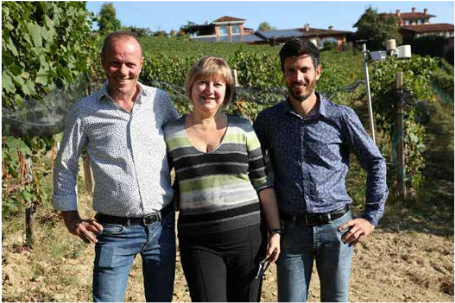We were born and raised in the hills that are home to Barolo, the wine we love and have dedicated our lives and passions to.
The history of our family is deeply linked to La Morra and to the rural roots of this part of the Langhe, which has succeeded in reinventing itself within the space of just a few decades, discovering an international vocation.
We are convinced that the work of winemakers must respond to a categorical imperative: the quest for quality
This is why we have chosen to leave the beaten track over the years and take paths that are often inaccessible, but where we see potential for growth.

We strive every day to make wines that are in step with the times while resisting the temptation to follow trends, as befits the great classics.
The vineyards: the beating heart of our work as winegrowers
The quality of wine is created in the vineyard, thanks to work that always respects the natural balance and terroir
We have embraced sustainable organic farming for over 20 years now, with no use of herbicides or synthetic fertilisers. We use sexual confusion to combat pests.
We maintain natural cover crops between the rows of vines, with flowers and beneficial plants. This not only combats erosion but also helps encourage the return of harmless insects which contribute to the health of the ecosystem, as well as the spread of natural yeasts which settle on the grape skins.
In 2013 we installed anti-hail nets in our vineyards, and these are key to preserving the quality of the grapes in view of climate change: as well as affording protection against hail, the nets protect the grapes from the aggressive action of the sun’s rays
Balance and quality in the cellar
We are convinced that 80% of the quality of a wine comes from the vineyard. This is why it is essential that the unique characteristics of the terroir remain clearly recognisable in the glass.
We perform medium macerations, which allow the gentle extraction of the typical aromas of the vineyard of origin, for wines with a structured body but reduced concentrations of tannin
We use second and third passage French oak barriques, selecting the cooperages that have been the most consistent and constant over the years. The wood must never overwhelm the wine but complement it, helping it achieve natural elegance while preserving cleanliness and freshness.
For our Barolo Paiagallo and Barolo del Comune di Serralunga, we have opted to use large barrels instead.
-
 Sold out
Sold outBarolo Docg Castelletto
Regular price $0.00 USDRegular priceUnit price / per -
 Sold out
Sold outBarolo Docg Gattera
Regular price $0.00 USDRegular priceUnit price / per -
 Sold out
Sold outBarbera D'alba Doc
Regular price $0.00 USDRegular priceUnit price / per -
 Sold out
Sold outLanghe Doc Nebbiolo Angelo
Regular price $0.00 USDRegular priceUnit price / per -
 Sold out
Sold outBarolo Docg
Regular price $0.00 USDRegular priceUnit price / per







